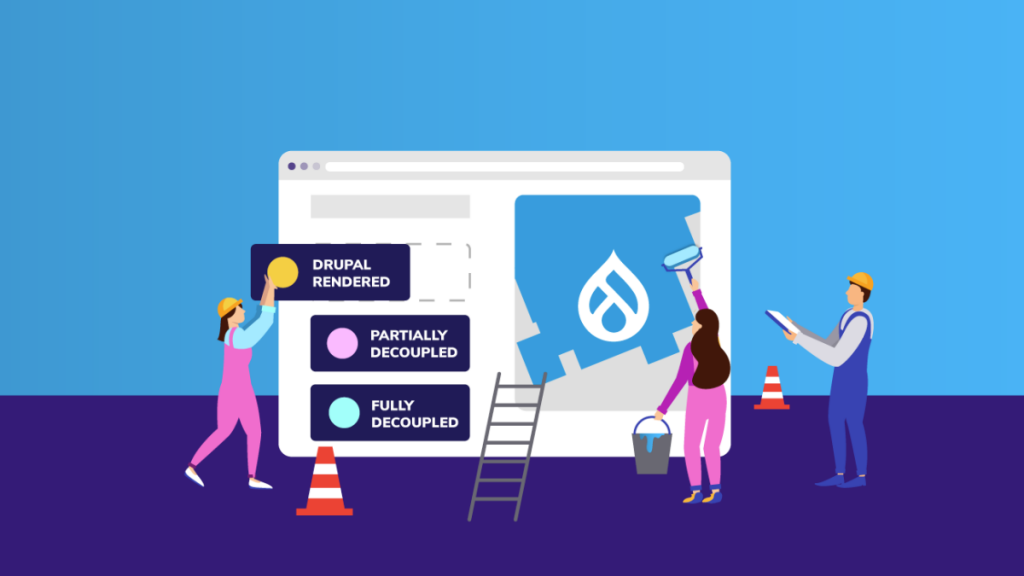Building a website is a significant undertaking, but is one of the most important things you can do for your business. Regardless of what industry you are in, a company without a website is going to struggle to keep up with their competitors. Your website can act as a digital portfolio, spruiking your benefits and achievements to potential customers. It also provides a simple way for new clients to get in touch.
Many people are put off by the idea of establishing or improving their online presence, as they see the exercise as being too costly or time consuming. In reality, nothing could be further from the truth, particularly if you go through a web development company.
Such a team may recommend that you use what is known as a CMS. A CMS — or content management system — is a software that is commonly used to build unique, secure, and functional websites. Drupal CMS is a fantastic example of this type of platform and comes highly recommended by many web developers.
Read on to discover a little more about Drupal CMS and what to expect from a website built from this software in 2021.
What is Drupal?
Drupal is what is known as a CMS or content management system. A content management system is a type of software that is designed to make developing and maintaining a website easy. Before the invention of CMS platforms, building a website from scratch required a lot of time, in-depth technical knowledge, and a trained developer on hand every time you wanted to make even the smallest of changes to your site.
Think of a content management system as a type of complex template from which a developer can use their skills and knowledge to build a customised site. Of course, few businesses these days can survive without a website. As such, it became important for web development to be simplified to the point where a developer can build you a state-of-the-art site that can then be maintained by someone with limited technical knowledge.
Drupal was one of the first CMS platforms to be released to the general public and remains one of the most popular content management systems. Other similar softwares you may have heard of include Kentico and WordPress. In fact, it is estimated that 39.6 percent of all websites on the internet are powered by the latter, which is a pretty incredible statistic.
Both WordPress and Drupal are what is known as an ‘open-source platform.’ That means that anyone can belong to the community of developers who are consistently working to improve the functionality and security of Drupal websites.
Drupal Facts and Features
Drupal was initially released some 20 years ago, in 2001. Since then, the platform has grown to become one of the largest developing communities in the world. Let’s take a look at some of the key facts and statistics that have marked Drupal’s 20 years of website building, plus some of the key features you can expect to benefit from in 2021.
- Drupal’s status as a leading CMS platform in 2021 is evident through the fact that over 1.7 million websites currently run on the software.
- There are Drupal developers all throughout the world and as such, the platform is proudly multilingual. Developers can access the software in over 100 different languages
- Drupal is particularly favoured by those looking to build a site that can handle significant levels of traffic. W3Techs reports that popular companies and organisations, including Pinterest, the IRS, and Cambridge University, have all built their websites using Drupal.
The Future of Drupal
As is the case with all CMS platforms, the developers behind Drupal are constantly making improvements and releasing updated software iterations. The latest Drupal version is Drupal 9.0, which was released in 2020. Drupal 9 promises enhanced security, improved load times, and better accessibility for all audiences. In addition, while websites that are operating using Drupal 7 and 8 will still be supported, such sites may be prevented from making the most of new features. Professionals who provide web development services strongly suggest upgrading your website as soon as possible.
What can we expect from the future of Drupal? Well, it might be worth referring back to the company’s mission statement for an idea as to where the developers might be heading. Drupal’s vision is to ‘establish the community-built Drupal software as the leading platform for the Web.’ As such, you can expect that any changes they make to their platform will be done following community consultation and with the aim to make the software more accessible.
Many CMS providers are looking to expand their offerings into the headless market. A headless CMS is a subset technology that consists of only a backend, where all the content is stored. This backend is connected to an API that is specifically designed for each intended platform. If, in the future, you find out more of your customers are using virtual headsets to access your site, you can build an API for this platform. This approach future-proofs your site and content. Drupal CMS 9 does offer headless capabilities, meaning their developers are certainly concerned about how to best prepare website owners for the future.
One of the best ways to get an idea of what new updates and features are on the horizon is to join the community of Drupal developers. Even if you don’t work for a web development company, simply owning a Drupal-built website is reason enough to get in touch with fellow community members. Who knows what you might learn!

